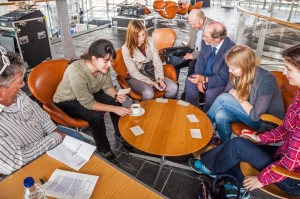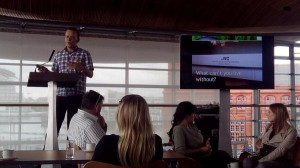Exhibition
A Sense of Energy from Carolina Vasquez on Vimeo.
–
Currently, there is a lot of interest in developing new research collaborations that enable social scientists to become more familiar with ways of working by academics and practitioners in fields such as the creative arts and interaction design. Such collaborative work can take many forms. For example, in December 2013 an event took place at the Wales Millennium Centre involving environmental risk and sustainability researchers and the performing arts (http://blogs.cardiff.ac.uk/environmentalfuturesdialogue), co-organised by members of the Energy Biographies team.
In 2013-2014, the Energy Biographies project team worked with colleagues from the Energy and Co-designing Communities project from Goldsmiths, University of London to put together a public exhibition, A Sense of Energy. Other projects whose work related to the themes of energy and communities also contributed exhibition content. These projects included EVALOC, RECCKN and CISE.
The aim of the exhibition was to use materials generated through the course of the various projects’ research activities (for example, text extracts, photographs and film) to create an engaging public event. Rather than presenting project findings, the exhibition used these materials to provide an opportunity for people to reflect on their energy use. The exhibition showed how it was possible for social scientists to take a more creative approach to designing and displaying their materials, data and other research resources, along with innovative ways of promoting public engagement with science. The team worked with conceptual designer Rachel Murphy to co-ordinate the exhibition and develop project content, and with community artist Chris ‘AcouChristo’ Young to capture energy sounds in each of the Energy Biographies case site areas. In addition, animator Tom Edgar developed a short animated film giving voice to views from Energy Biographies interviewees on what they considered constitutes ‘essential’ energy use.
A Sense of Energy followed on from a capacity building workshop – Multimodal social science, Community engagement, and Energy demand reduction – also hosted by the Cardiff University energy biographies team, and held in Cardiff City Hall, July 2013.
The exhibition was first held at the White Building, Hackney Wick, London from 26-28th June 2014 and then at the Senedd, in Cardiff Bay from 30th September-2nd October 2014.
London
For pictures see our facebook page
Cardiff
The Cardiff exhibition was also held at the Senedd, Cardiff Bay from 30th September-2nd October. For a blog about the event see our news and views blog. For pictures see our facebook page.
A Sense of Energy – Report on Energy Café Discussion
As part of the exhibition held at the Senedd, the home of the Welsh Assembly in Cardiff Bay and coordinated by Energy Biographies and Goldsmiths College, we organised an Energy Café event to allow visitors to the exhibition to discuss issues raised by the interactive exhibits from five UK projects funded by the UK Research Councils Energy programme that were featured in the event. Visitors to the exhibition were presented with a deck of cards on which a range of energy-related questions were written. They were then invited to attend the Café upstairs in the Oriel gallery in the Senedd, hosted and chaired by Dr Chris Groves from the Energy Biographies project.
Questions to which attendees were asked to respond included:
• What is wasteful?
• Is waste always bad?
• What can’t you live without?
• Can we help future generations by changing the ways in which we use energy?
The event was run on the model of World Café-style discussion events, as used at the monthly Cardiff Philosophy Café events also chaired by Dr Groves. While there was general agreement on the capacity (in principle) of present generations to help future generations, questions were raised about who in the present might actually possess the agency required to get things done. Asking individuals to be the prime movers in re-shaping how we collectively use energy was seen as moving in the wrong direction. Given the short time horizons democratic governments operate with, one audience member wondered whether more stability might be derived from governments with longer terms of office. Others asked whether community-level initiatives (such as those studied as part of the Energy Biographies project at its four case sites in Ely, Peterston, Lammas and the Royal Free Hospital) were a more fruitful way to go. Policy might, in such cases, be more concerned not with how to distribute energy resources between present and future generations, but with how to ensure that agency is granted to communities and those who live in them to take greater control of their (energy) futures.
Energy Biographies research suggests, however, that there are further complexities to be explored relating to people’s relationships with energy. Policy interventions undertaken at any particular level, including that of individual communities, can run into difficulties if policymakers do not reflect sufficiently on the emotional investments people make in the existing fabric of everyday life, and in particular in what it affords them by way of valued cultural attachments and possible/imagined/future identities. In addition, simply acknowledging dependence or interdependence may not be sufficient, given that individuals’ involvement in particular practices may reflect their own feelings and reactions to dependence, interdependence and autonomy.
Discussion at the energy café also touched on these themes, suggesting that simply expanding the time horizons within which governments operate and making communities more responsible for shaping energy use might risk disconnecting with issues relating to how individuals, as part of communities but also as individuals, make sense of and respond emotionally to relationships of dependence and interdependence.
The exhibition and energy café join other recent projects undertaken by members of the EBs team in demonstrating the potential of collaborative work between academics, artists and designers combined with deliberative spaces for promoting deeper reflection on the ways in which everyday life shapes engagement with the practices and infrastructure on which contemporary society is dependent, and how spaces of transformation rooted in everyday life may be opened up. As a further development of research work, discussions arising from the exhibition therefore point in turn to a need for more intellectual work to generate understanding of the meshing of everyday life, practice and relationships of dependence on energy infrastructure.
In particular, there are questions about the nature of democratic governance and the cultural formations that shape subjectivity and also regarding the various forms of energy (including embodied energy as well as that produced and distributed via energy infrastructure etc.).
Twitter: #asenseofenergy
Photographs of the Senedd Energy Cafe courtesy of Merryn Thomas and @wouterpoortinga

